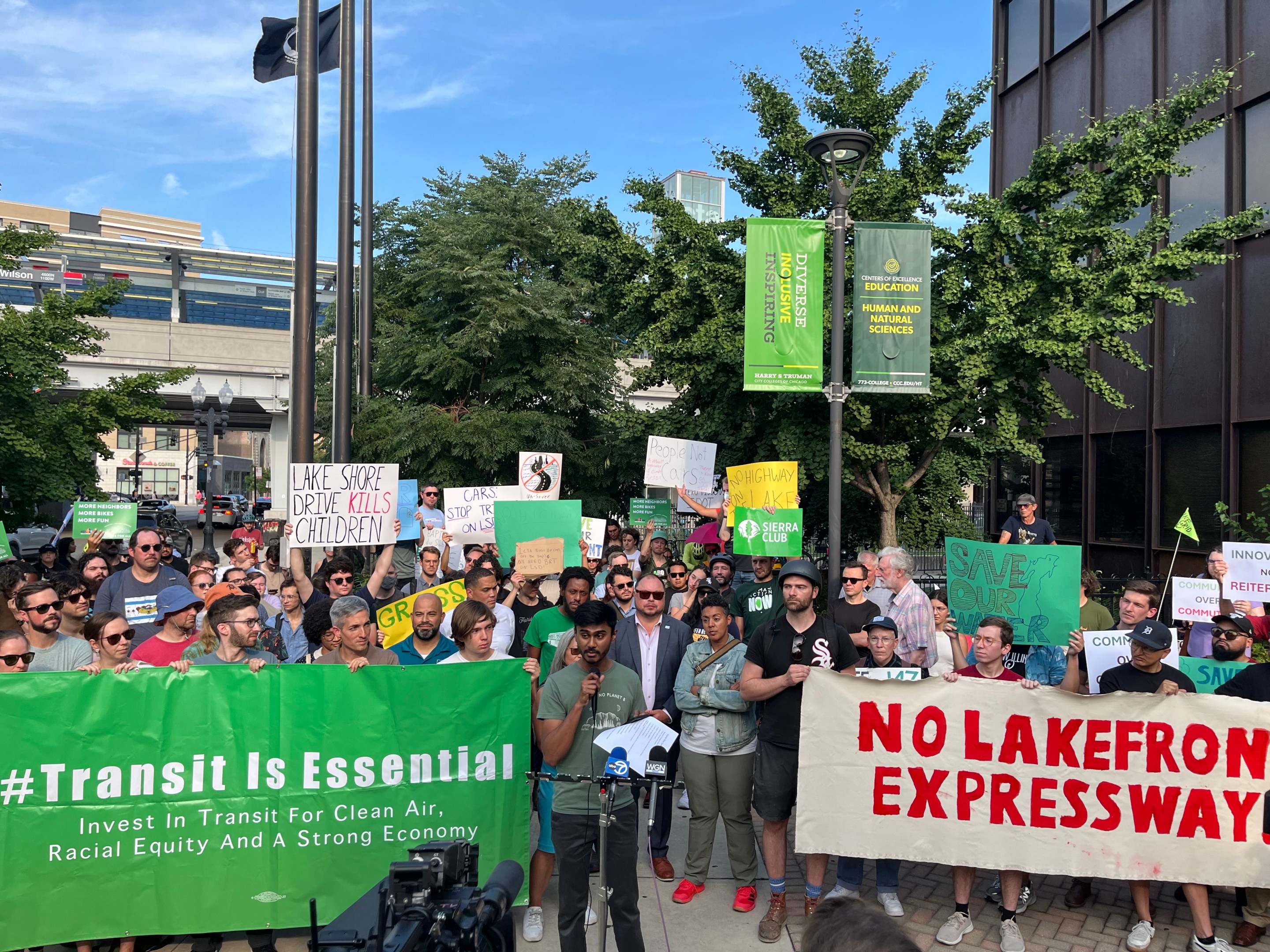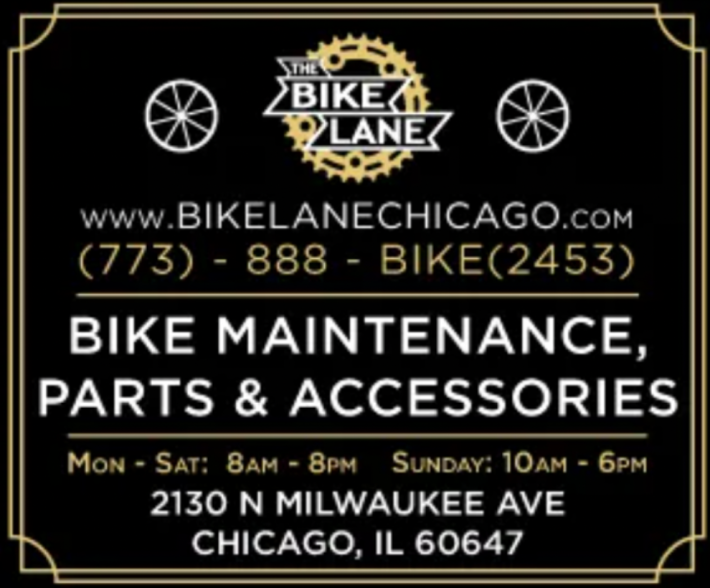
At the Save Our Lakefront Rally, hundreds of people called on the Illinois and Chicago transportation departments to halt plans to rebuild North DuSable Lake Shore Drive as a car-choked eight-lane barrier to Chicago's lovely shoreline. The demonstration took place outside the IDOT and CDOT open house on the recommendations from their Redefine the Drive study, at Truman College, 1445 W. Wilson Avenue, next to the Wilson Red Line station.

At one point in the gathering, Rony Islam from Chicago, Bike Grid Now! said of the gathering, "This feels like a Jane Jacobs moment." He was accurately comparing the movement to the legendary NYC urbanist and activist's successful campaign against notorious city planner Robert Moses' destructive Lower Manhattan Expressway scheme.
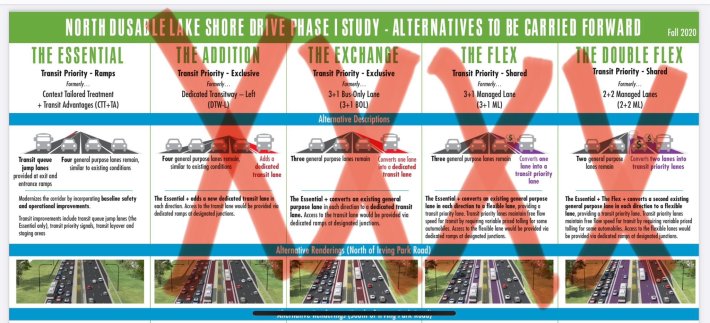
If you're unfamiliar with the backlash to IDOT and CDOT's proposal, you can get up to speed here. But, in a nutshell, sustainable transportation and environmental advocates have joined forces with dozens of Chicago and Illinois lawmakers to fight the decision to keep all eight lanes available to traffic jam-creating drivers. They want to see two of those lanes reserved for fast, reliable transit service.
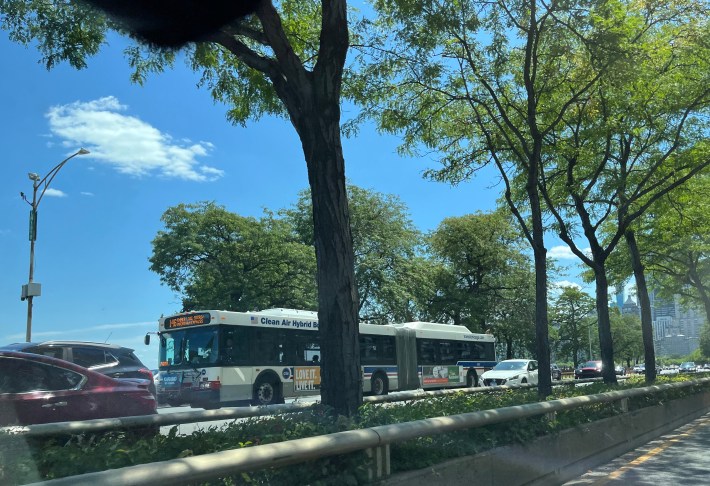
Preferably the highway would be converted to a more people-friendly surface boulevard that would make it easier to walk, roll, bike, and take buses to the beach.

Here's a list of the rally sponsors:
- Active Transportation Alliance
- Better Streets Chicago
- Chicago, Bike Grid Now!
- Commuters Take Action
- Edgewater Environmental Coalition
- Sierra Club Chicago
- Urban Environmentalists Illinois
At the start of the demo, the massive throng chanted, "No more highway! Save our lakefront!" Better Streets executive director Kyle Lucas emceed the event and kicked off the speeches. "We are out here tonight demanding change on our lakefront," he told the crowd. "I am so proud to be here today with... community organizers, to be here today with with advocacy organizations, and to be here today with elected officials, all who are standing here united in a demand that we don't want a highway on our lakefront. We want a different future than what IDOT and CDOT are presenting to us." The audience erupted with cheers.
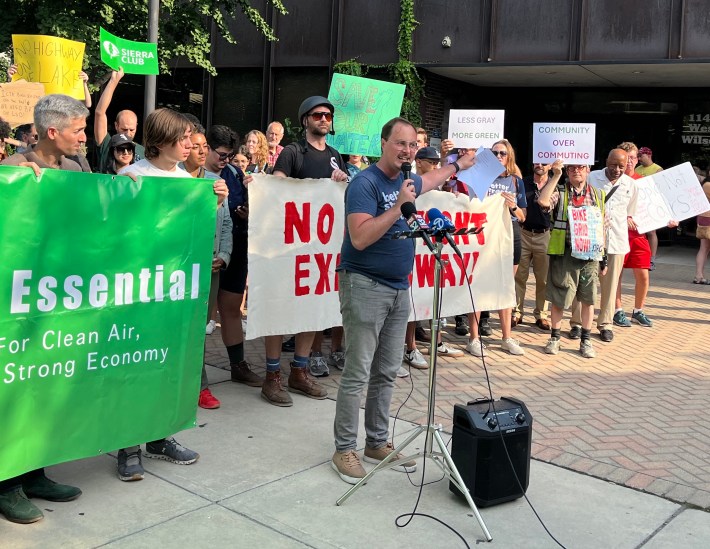
"For a decade, the Illinois Department of Transportation has been telling us that we can't have transit improvements on the lakefront... that we have to have an expressway, something that is forbidden by the municipal code," Lucas said. "That ain't right!" The crowd shouted back the phrase.
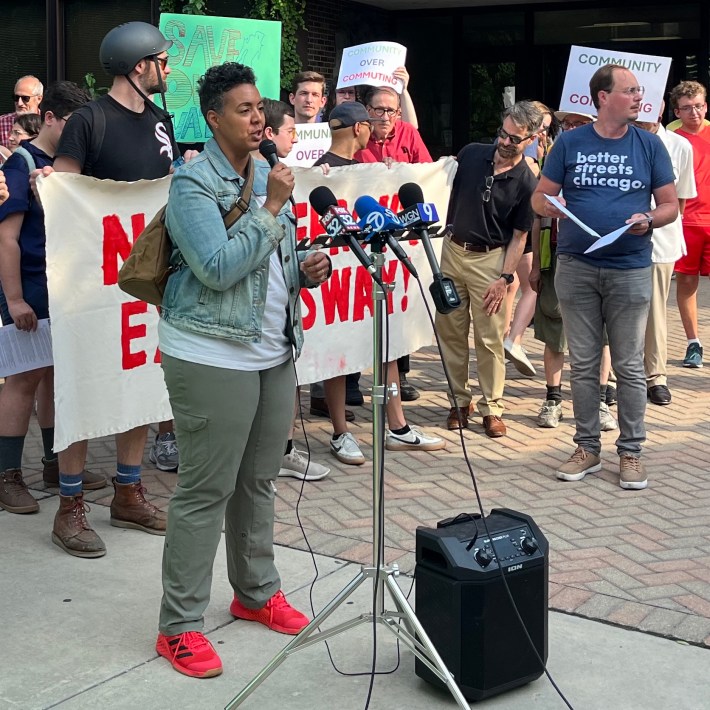
Next up was Ald. Maria Hadden (49th) of Rogers Park, Chicago's northermost lakefront ward and chair of the City Council's Committee on Environmental Protection and Energy. "This is a once in a lifetime opportunity for the City of Chicago and the State of Illinois to create, and literally rebuild and reimagine a different future for our lakefront," she said. "We know that we need to see active transportation prioritized."
"We appreciate the decade of work that IDOT, that CDOT, that folks have done, but we don't see that reflected in their plans that are put forth the future that we know we can have for Chicago," Ald. Hadden added. She noted that the final NDLSD design with no dedicated bus lanes is called "The Essential." But she said that back when her neighboring colleague Ald. Andre Vasquez (40th), worked selling cell phone contracts, the cheapest, most basic plan had the same name, "The Essential". "It's not good enough," she said.
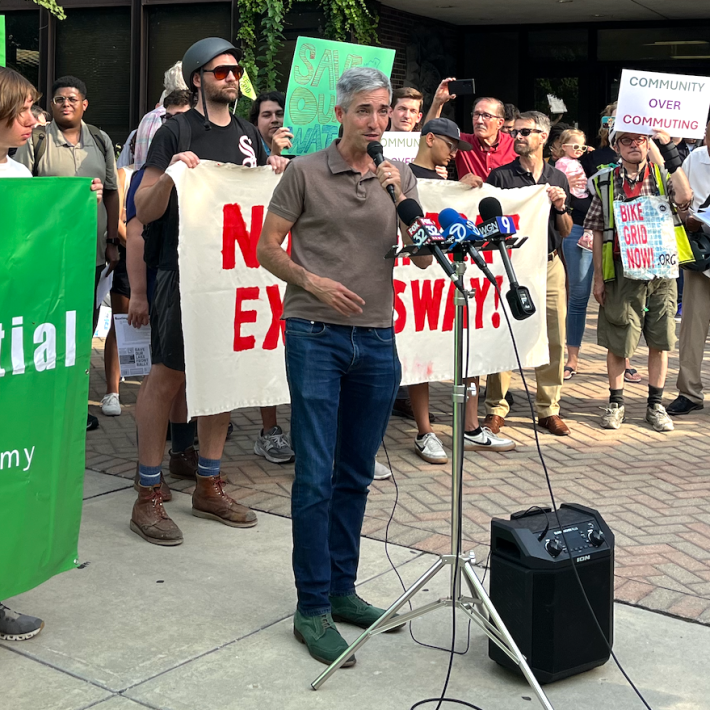
She was followed by Ald. Daniel La Spata (1st) from the Near Northwest Side, chair of the Committee on Pedestrian and Traffic Safety. "[The committee] informs this work for me," he said. "I love my feet, I love my bike, I love the bus and so does my daughter. And, at times, you gotta drive too." But he added that the current plan for the NDLSD, which has already seen multiple fatal car crashes this year, will make it even more dangerous for drivers.
Ald. La Spata noted that IDOT is planning to get rid of the road's S-curve at Oak Street, and remove its Chicago Avenue stoplights. "But when you smooth out the curve, when you take away traffic signals, you don't just reduce delays, you increase speeds," he said. "Increasing speeds leads to more fatalities. This is common sense." Attendees clapped in affirmation.
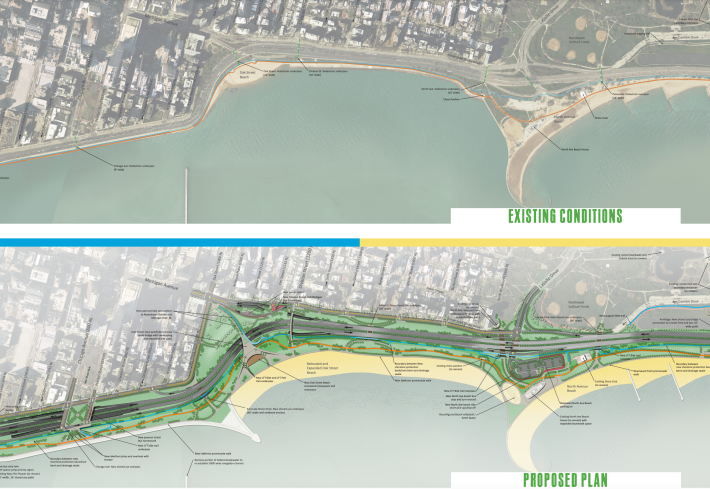
"We can do better," Ald. La Spata concluded. "We can have our cake and eat it too. We can have more green space and bus-only lanes. We can can have safer streets and a boulevard feel. We do all of it. But that's only if in this moment we have the courage to demand better."
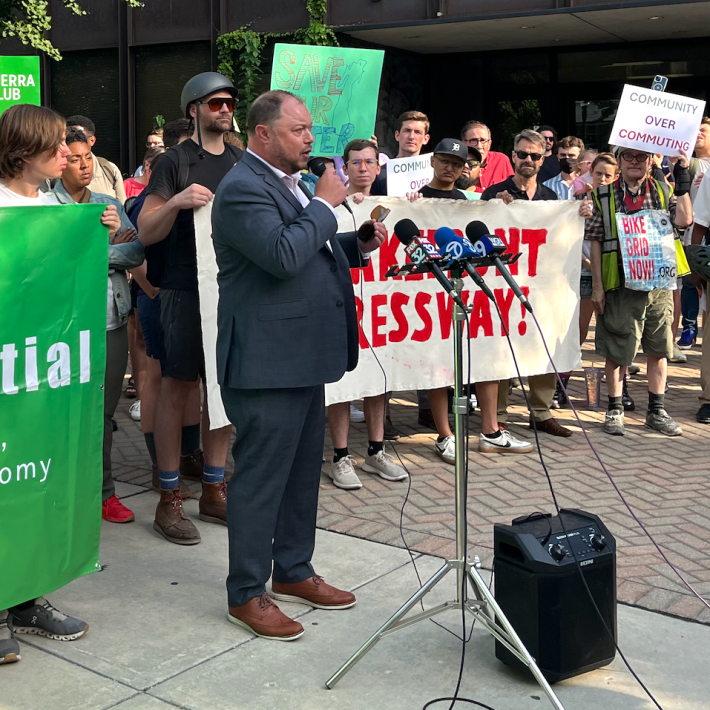
After that was Ald. Bennett Lawson (44th), from the waterside Lakeview community, who talked about "granular" neighborhood issues that he said aren't being addressed in the Redefine the Drive plan. "The Belmont/Sheridan intersection is one of the most dangerous on the entire North Side, and there are no changes to it under this plan. The Aldine on-ramp is functionally a Belmont alternative that will not change in this plan. I need to make my streets safer, and make it safer for folks to access their park." He said his ward would actually be losing green space as part of the proposal.
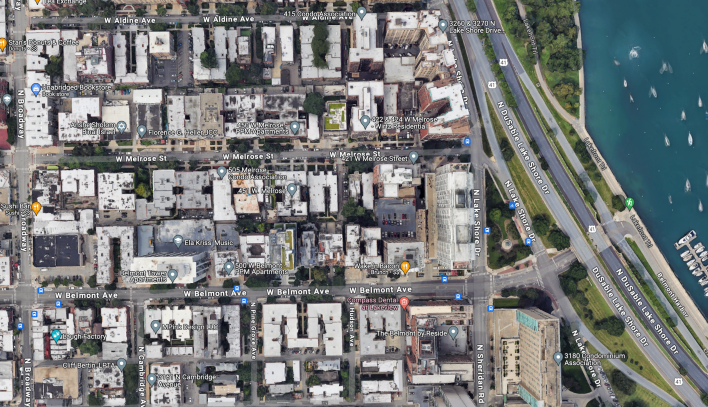
Next the crowd chanted "Buses, bikes, trains are great, no expressway on the lake!" and "Save our lakefront, stop the highway!"
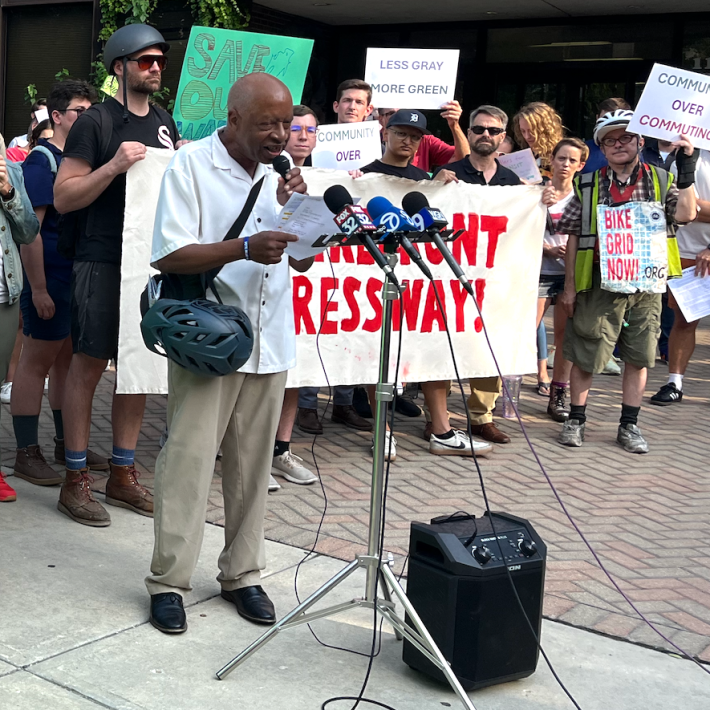
The following speaker was Active Transportation Alliance Campaign Organizer W. Robert Schultz III, also a leader of the Transportation Equity Network and a longtime sustainable transportation advocate. "The first principal in Chicago should be 'People are more important that cars," he said. The audience cheered. He noted that years ago DLSD was rebuilt on the South Side as a limited-access highway, with little or no input from local residents. Attendees booed. "Now the South Lakefront is practically inaccessible, except for an occasional fancy bridge. And drivers ignore the posted speed limit to drive at whatever speed they believe is reasonable... Do we want to make the same mistake on the North Lakefront?"
Chicago, Bike Grid Now! member Rony Islam spoke next, arguing that "CDOT and IDOT are in [the open house] manufacturing consent." He said the department's engineering and modeling practices reflect 20th Century transportation concepts, and are out of touch with modern reality.
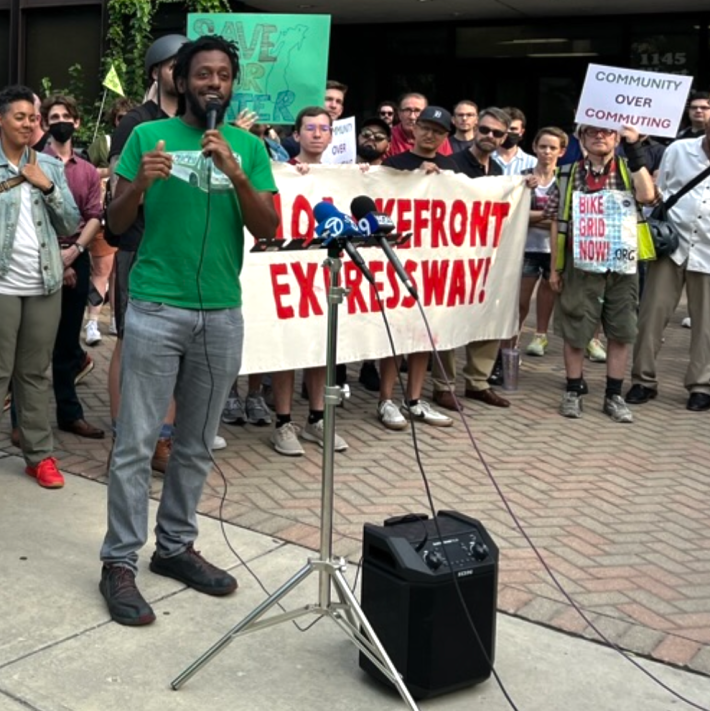
After him was State Sen. Mike Simmons (7th), who represents several Chicago neighborhoods not far from Truman College. He discussed how important biking, transit and the shoreline were for him as a youth growing up in a working-class family on the North Side and exploring the region. "We love the the lake because it's such a precious asset," he said.
Much of Sen. Simmons' speech addressed the issue of traffic violence, including the need for safer surface streets, and well as a lakefront road that doesn't enable speeding by 80 mph, as is currently the case on NDLSD. He noted that in June 2022 unsafe conditions on nearby Leland Avenue forced the family of Lily Shambrook, 3, to lay her to rest after a bike crash. "I'm going to be fighting like hell to make sure the vision [of safe streets] is heard," Simmons concluded. "Let's get this right for the next 100 years in Chicago."
Other speakers included State Sen Robert Peters (13th), Ald. Leni Manaa-Hoppenworth (48th), Sativa Volbrecht from the Sierra Club of Illinois, Access Living Senior Policy Analyst Lauren Saltzman, Urban Environmentalists Illinois co-lead Jack Warren and Ald. Andre Vasquez (40th).
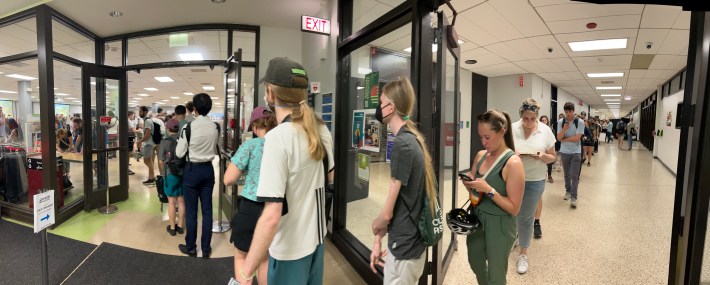
"We're going to go to every corner of the city let people know this is happening," Better Streets' Kyle Lucas declared at the end of the speeches. "Go inside and make your voice heard." As you can see from these photos from the open house after the rally, the rally attendees did just that.

Streetsblog Chicago will provide an Illinois Department of Transportation staffer's perspective on the rally and the complaints about the design in the near future. But I can tell you now that one IDOT employee said they were impressed by the huge turnout.
So was Michael Burton, the cofounder of the weekly Chicago Critical Mass bike rides and co-organizer of the Campaign for a Free and Clear Lakefront, who attnded Thursday's rally. Back in the early 2000s, the latter group announced an only-half-joking mission to "Depave [DuSable] Lake Shore Drive." How does he feel now that the idea of making our city's lakefront less car-oriented is picking up speed?
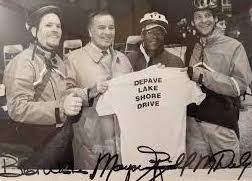
"It's very exciting," Burton replied. "When we were doing it, it was based more out of the Critical Mass rides, and it was more theater, and sort of provocative. And it seems like those ideas have come to fruition through community organizing. And it's exciting to see a big coaliltion coming together for reclaiming the most valuable land in our city, for the people instead of cars."
Watch videos of all the speeches, posted by the Active Transportation Alliance, here.
Click here to check out the IDOT/CDOT open house materials.

Did you appreciate this post? Please consider making a tax-deductible donation, to help keep Streetsblog Chicago's sustainable transportation news and advocacy articles paywall-free.
